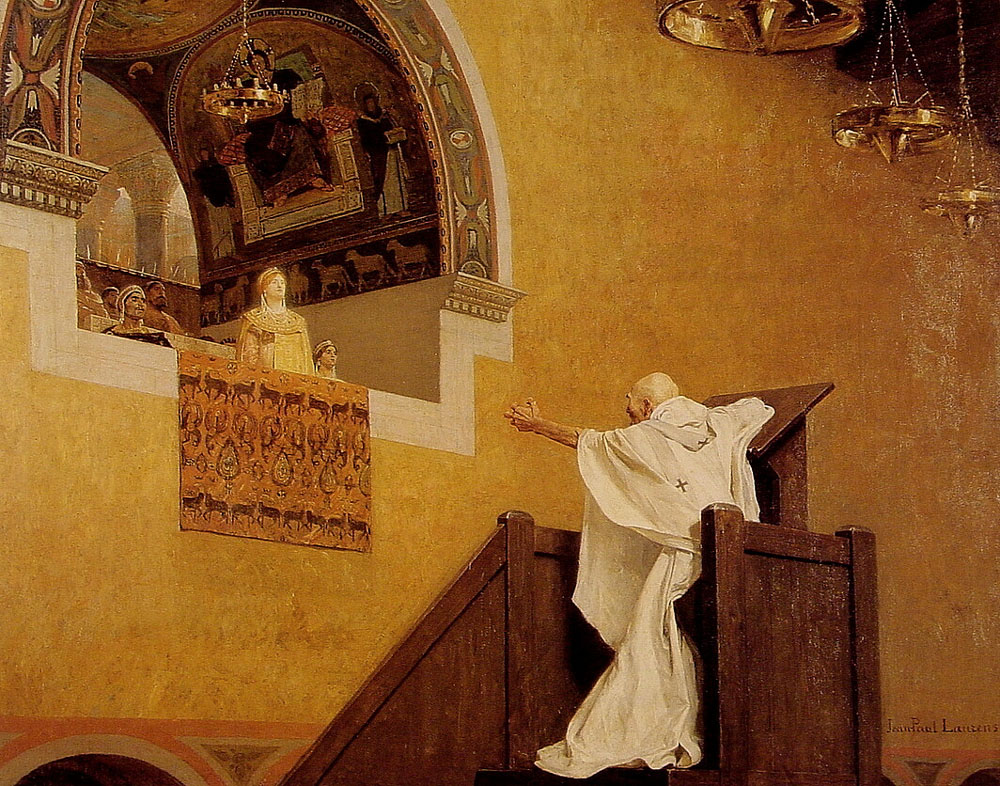On This Day September 14 470AD
By Khen Lim
John Chrysostom railing at Aelia Eudoxia in a 19th century painting by Jean-Paul Laurens
Image Source: en.wikipedia.org
It was inevitable. Like
Origen, this truly outstanding Early Church Father whose fatal flaw was his
critical denunciations of extravagance, paganism, immorality and ignorance of
the poor would find himself at opposite ends of the royal rulers.
In speaking boldly
against the sins of Constantinople in which he was the Archbishop, John the
Patriarch had by 405AD been consigned to exile in Cocysus in Abkhazia in the
Anti-Taurus Mountains. His fiery sermons had inflamed and shamed the elite and
amongst them was Aelia Eudoxia,
wife of Emperor Arcadius, who with the help of Theophilus, pulled strings to
get him banished.
Already in poor health with
damaged stomach and kidneys, John had suffered up the mountains through the
winter. Pope Innocent I had sent a delegation to Constantinople to protest his
banishment but to no avail. John had no wood in the fire, no blankets on his
bed to keep him warm. Yet he found enough strength to continue writing strong
letters to the people who were under his care. A lawyer by profession, John’s
letters, sermons and homilies were and still are masterpieces of Christian
literature and even in his absence, churches were still seeking and receiving
directions from him.
This aggravated his enemies who
felt that his power and influence was still too great for their comfort and his
presence was too intimidating. They cared not that he was too old and frail to
do anything and so they resorted to bribe the guards to move him further to the
Euxine (Black) Sea by offering a reward that would be commensurate with how
quickly they could transfer him. Considering the foreboding move, it was clear
to the guards that John would be walking to his death but all the same, none of
them showed mercy. And so, relentlessly, they hurried his tottering legs
forward.
Every movement was torture to
John who was in all sorts of pain. And five miles out of Comana Pontica Pontus
(now in Turkey), he spent his final night in a church dedicated to another
martyr, Bishop Basliscus. On the night before his death, September 13, the
Bishop appeared in his dream saying, “Tomorrow, we shall be together.”
There in church, John asked the
guards and was given a white robe which he put on in replacement of his old
clothes. Surrounded by monks and nuns, he raised his arms, saying, “Glory be to
God for all things. Amen” (δόξα τῷ θεῷ
πάντων ἕνεκεν. Amin.) Those were his last words. He died on
this day, September 14, 407.
The title “Chrysostom” (golden
mouth, Χρυσόστομος) was given to him in honour
following his death. His remains were returned to Constantinople only after
Proclus’ homily in the Church of Hagia Sophia praising John had moved the
Emperor. Other than the harshness of eight anti-Semitic homilies he gave, John
is today remembered as one of the greatest Christian orators of all history and
a saint honoured in many churches.
Kelly, J. N. D. Golden Mouth;
the story of John Chrysostom, Ascetic, Preacher, Bishop. Grand Rapids,
Michigan: Baker Books, 1995.
"Chrysostom, St. John." The
Oxford Dictionary of the Christian Church, edited by F. L. Cross and
E. A. Livingstone. Oxford, 1997.
No comments:
Post a Comment